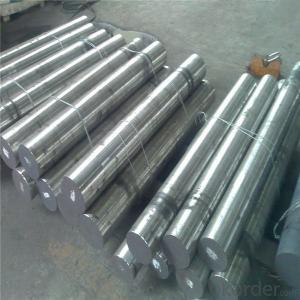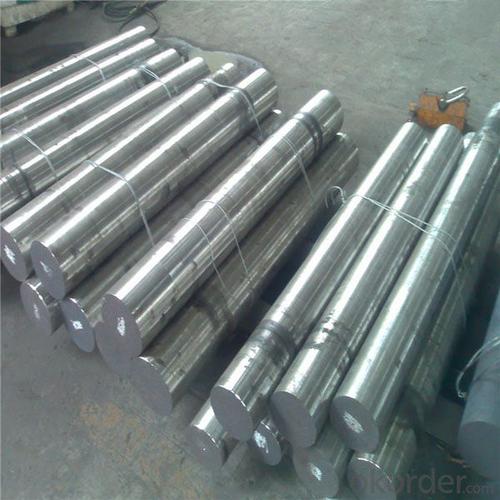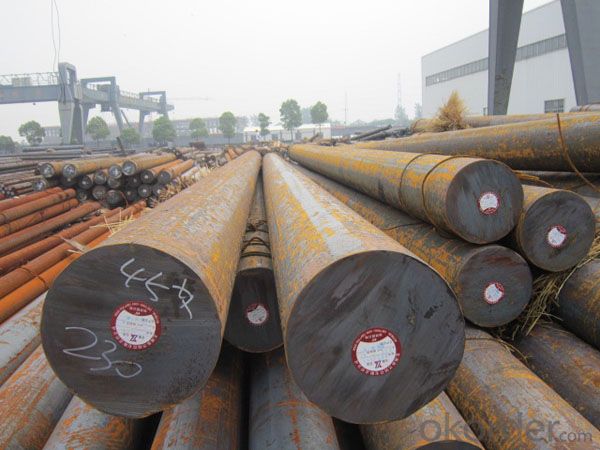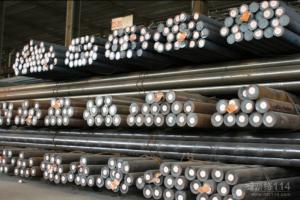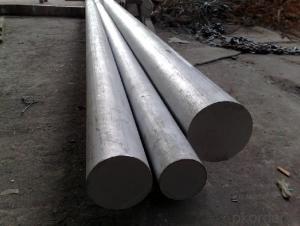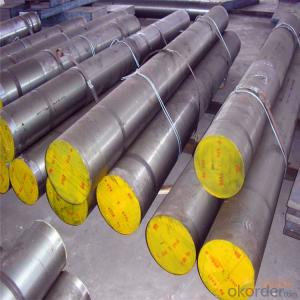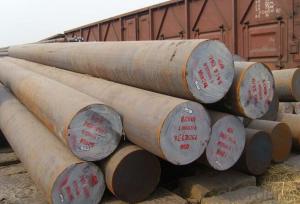Alloy Steel 52100 Bearing steel Special Steel
- Loading Port:
- China main port
- Payment Terms:
- TT OR LC
- Min Order Qty:
- 25 m.t.
- Supply Capability:
- 10000 m.t./month
OKorder Service Pledge
OKorder Financial Service
You Might Also Like
Specification
The details of our Steel
1. Produce Standard: as the GB, AISI, ASTM, SAE, EN, BS, DIN, JIS Industry Standard
2. Produce processes: Smelt Iron -EAF smelt Billet - ESR smelt Billet -Hot rolled or forged get the steel round bar and plate
3. Heat treatment:
Normalized / Annealed / Quenched+Tempered
4. Quality assurance:
All order we can received Third party inspection, You can let SGS, BV,.. and others test company test and inspect our products before Goods shipping.
Product information
Chemical Composition(GB)%
C | Si | Mn | Cr | Cu | S |
0.95-1.05 | 0.15-0.35 | 0.25-0.45 | 1.4-1.65 | ≤0.20 | ≤0.020 |
Heat Treatment
Item | Temperature ℃ | Hardness |
Anneal | 790-810 | 170-207HB |
Quenching | 830-860 | 62-66HRC |
Tempering | 150-180 | 61-66HRC |
Characterstics
1.Uniform hardness,Good abrasion resistance |
2.High contact fatigue resistance |
3.Cutting performance in general |
Applications: Used to make the load of the larger small cross-section conditioning and stress smaller large parts
Product show

Workshop show

- Q: What are the challenges in machining special steel?
- Machining special steel presents several challenges due to its unique properties. Firstly, special steel is known for its high hardness, which makes it difficult to cut and shape without proper tools and techniques. Additionally, special steel often contains alloying elements that increase its strength and resistance to wear, but also make it more prone to work hardening and heat buildup during machining. This requires careful selection of cutting parameters and cooling methods to prevent tool wear and surface damage. Furthermore, the presence of impurities or non-metallic inclusions in special steel can cause tool chipping or premature failure, necessitating the use of specialized tooling and processes. Overall, the challenges in machining special steel lie in its hardness, work hardening tendencies, heat generation, and the need for precision tools and techniques.
- Q: How does special steel ensure product reliability?
- Special steel ensures product reliability through its unique properties and manufacturing processes. Special steel is designed to have exceptional strength, durability, and resistance to corrosion, wear, and fatigue. These enhanced properties make it suitable for various critical applications where reliability is paramount, such as in automotive, aerospace, energy, and infrastructure industries. Special steel undergoes rigorous quality control measures during its production to ensure consistency and adherence to specific standards. This helps in minimizing variations and defects, ensuring that the final product meets the required specifications and performs reliably under challenging conditions. Additionally, special steel's ability to be tailored and customized enables manufacturers to create products that are precisely engineered to withstand specific operating environments, further enhancing their reliability.
- Q: What are the properties of shock-resistant steel?
- Shock-resistant steel is a type of steel that possesses certain properties that make it highly resistant to shock or impact. These properties include high toughness, strength, and ductility. It can absorb and distribute the energy generated by an impact, thus preventing the material from fracturing or breaking. Additionally, shock-resistant steel often has a high hardness, which further enhances its ability to withstand sudden loads and impacts without deforming or failing. These properties make shock-resistant steel suitable for applications that require protection against heavy impacts, such as in construction, automotive, and military industries.
- Q: What are the different cryogenic grades of special steel?
- There are several different cryogenic grades of special steel that are specifically designed to perform well in extremely low temperature environments. These grades are developed to maintain their mechanical properties and resist brittleness at cryogenic temperatures, making them suitable for applications such as liquefied natural gas (LNG) storage tanks, aerospace equipment, and low-temperature chemical processes. One commonly used cryogenic grade of special steel is the 300 series stainless steel, particularly the types 304 and 316. These stainless steels contain nickel, which enhances their cryogenic toughness and resistance to thermal stress. They are often used in the construction of cryogenic storage vessels and piping systems. Another popular cryogenic grade is the 9% nickel steel. This type of steel is alloyed with around 9% nickel, which provides excellent low-temperature toughness and ductility. 9% nickel steel is commonly used in the construction of LNG storage tanks, as it can withstand the extreme cold temperatures required for the storage and transportation of liquefied natural gas. Additionally, there are special low-temperature carbon steels, such as ASTM A350 LF2 and ASTM A333 Grade 6, which are designed to maintain their toughness and impact resistance at cryogenic temperatures. These steels are often employed in low-temperature applications such as cryogenic piping systems and equipment for the oil and gas industry. In summary, the different cryogenic grades of special steel include stainless steels (such as 300 series stainless steel), 9% nickel steel, and low-temperature carbon steels (like ASTM A350 LF2 and ASTM A333 Grade 6). Each grade is specifically engineered to withstand the challenges posed by extremely low temperatures while maintaining their mechanical properties and resistance to brittleness.
- Q: What are the main characteristics of wear-resistant castings?
- Wear and abrasion pose tough challenges in various industries, including mining, construction, cement, and steel manufacturing. To combat these challenges, wear-resistant castings are purposefully designed. These castings boast several key characteristics: 1. Hardness: Wear-resistant castings are crafted from materials with exceptional hardness ratings. This quality enables them to withstand friction, impact, and surface damage, preventing deformation. 2. Toughness: Apart from their hardness, these castings also possess high toughness. This means they can endure immense energy absorption without fracturing or breaking, ensuring their longevity and durability in demanding environments. 3. Corrosion resistance: Often, wear-resistant castings are resistant to corrosion and oxidation. This feature aids in extending their lifespan and maintaining their performance, even in corrosive or high-temperature conditions. 4. Heat resistance: With the ability to withstand high temperatures without compromising their hardness or strength, wear-resistant castings are perfect for applications involving heat generation or transfer. Industries like industrial machinery or power plants can benefit greatly from this quality. 5. Wear resistance: As the name implies, the primary characteristic of wear-resistant castings is their ability to resist wear. They are designed to minimize material loss caused by abrasion, erosion, or friction. Consequently, they ensure a longer lifespan and reduced maintenance requirements. 6. Customizability: Wear-resistant castings can be tailored to meet specific applications and requirements. They can be produced in a range of shapes, sizes, and configurations, offering customized solutions for wear-related challenges in different components and machinery. Overall, wear-resistant castings play a vital role in industries where wear and abrasion are prevalent. By increasing equipment lifespan and reliability, reducing downtime, and improving operational efficiency, these castings prove to be indispensable components in various sectors.
- Q: What are the different molding grades of special steel?
- There are several different molding grades of special steel that are used in various industries and applications. Some of the commonly known molding grades include: 1. P20: This grade is widely used in the production of plastic injection molds, die casting, and extrusion dies. It offers excellent machinability, high hardness, and good polishability, making it suitable for high-precision molding. 2. H13: This grade is a hot work tool steel that is primarily used for die casting and forging applications. It offers high toughness, good heat resistance, and excellent wear resistance, making it suitable for high-temperature molding processes. 3. S7: This grade is a shock-resistant tool steel that is commonly used for molding applications where high impact resistance is required. It offers good hardness, toughness, and machinability, making it suitable for applications such as shear blades and hammer dies. 4. NAK80: This grade is a pre-hardened mold steel that is often used for high-quality mirror surface molds and precision molding applications. It offers high polishability, excellent dimensional stability, and good wear resistance, making it suitable for producing parts with high surface finish requirements. 5. 420SS: This grade is a stainless steel that is commonly used for molding applications where corrosion resistance is required. It offers good hardness, moderate strength, and excellent corrosion resistance, making it suitable for applications such as medical devices and food processing equipment. These are just a few examples of the different molding grades of special steel available in the market. Each grade has its own specific properties and characteristics, which make them suitable for various molding applications. It is important to select the appropriate grade based on the specific requirements of the molding process to ensure optimal performance and durability.
- Q: What are the requirements for special steel used in packaging machinery?
- The requirements for special steel used in packaging machinery can vary depending on the specific application and the type of packaging machinery being used. However, there are some common requirements that are typically expected for this type of steel. Firstly, the special steel used in packaging machinery should have excellent corrosion resistance. This is because packaging machinery often comes into contact with various liquids, including water, oils, and cleaning solutions. Corrosion resistance helps to prevent the steel from deteriorating or rusting when exposed to these substances, ensuring the longevity and reliability of the machinery. Secondly, the steel should possess high hardness and wear resistance. Packaging machinery often involves moving parts and components that are subjected to constant friction and wear. Therefore, the steel used in these parts should be able to withstand the repetitive contact and abrasion without undergoing significant wear or deformation. High hardness also helps to prevent the formation of scratches or grooves on the surfaces, which can compromise the quality of the packaging. Additionally, the special steel should have good machinability and formability. Packaging machinery often requires complex shapes and intricate designs, so the steel should be easily machinable and capable of being formed into the desired shapes and sizes. This facilitates the manufacturing process and allows for the creation of precise and accurate components. Furthermore, the steel should possess high tensile strength and toughness. Packaging machinery may be subjected to mechanical stresses and impacts during operation, and the steel used in its construction should be able to withstand these forces without fracturing or breaking. High tensile strength ensures the structural integrity of the machinery, while toughness helps to prevent the formation of cracks or fractures under sudden loads or impacts. Lastly, the special steel used in packaging machinery should be cost-effective and readily available. The cost of the steel should be reasonable and within the budget of the manufacturer, without compromising the quality or performance of the machinery. Additionally, the steel should be readily available in the market to ensure a continuous supply for manufacturing purposes. Overall, the requirements for special steel used in packaging machinery include corrosion resistance, high hardness and wear resistance, good machinability and formability, high tensile strength and toughness, and cost-effectiveness. Meeting these requirements ensures the durability, reliability, and efficiency of the packaging machinery in various industrial applications.
- Q: How is alloy steel used in the manufacturing of gears and shafts?
- Alloy steel is commonly used in the manufacturing of gears and shafts due to its superior strength, durability, and resistance to wear and tear. This type of steel is created by combining iron with other elements, such as manganese, nickel, chromium, or molybdenum, to enhance its mechanical properties. The alloying elements increase the hardness, toughness, and heat resistance of the steel, making it ideal for handling the high stresses and loads experienced by gears and shafts in various machinery and automotive applications. Additionally, alloy steel can be heat-treated to further improve its strength and wear resistance, ensuring the longevity and reliability of gears and shafts in demanding operating conditions.
- Q: What are the different casting methods used for special steel?
- There are several different casting methods used for special steel, including sand casting, investment casting, continuous casting, and centrifugal casting. Each method has its own advantages and is suited for specific applications. Sand casting is a common and cost-effective method that involves pouring molten steel into a sand mold. Investment casting, on the other hand, uses a wax pattern that is coated in a ceramic shell and then melted away to leave a cavity for the steel to be poured into. Continuous casting is a continuous process where molten steel is poured into a water-cooled mold and solidifies into a continuous strand. Finally, centrifugal casting involves spinning a mold while pouring the molten steel, creating a centrifugal force that helps distribute the metal evenly. These different methods allow for the production of special steel components with various sizes, shapes, and properties.
- Q: How does special steel contribute to the manufacturing of cutting blades for industrial machines?
- Special steel plays a crucial role in the manufacturing of cutting blades for industrial machines due to its unique properties and composition. Firstly, special steel exhibits exceptional hardness, which is essential for cutting blades to withstand the high pressure and abrasion that occurs during industrial cutting operations. This hardness ensures that the blades remain sharp for extended periods, minimizing the need for frequent replacement and reducing downtime in manufacturing processes. Moreover, special steel offers remarkable toughness, allowing cutting blades to endure heavy loads and resist chipping or breaking. This is particularly important in industrial settings where cutting blades are subjected to intense forces and must maintain their integrity to ensure efficient and reliable cutting operations. Additionally, special steel has excellent resistance to corrosion and wear, making it an ideal material for cutting blades used in harsh environments, such as those involving exposure to chemicals, extreme temperatures, or abrasive materials. This corrosion resistance prolongs the lifespan of the cutting blades, reducing maintenance costs and enhancing overall productivity. Furthermore, special steel can be customized to meet specific requirements, allowing the manufacturing of cutting blades with precise dimensions, shapes, and cutting angles. This customization ensures that the blades are tailored to the unique needs of different industrial machines and applications, optimizing cutting performance and efficiency. In summary, special steel contributes significantly to the manufacturing of cutting blades for industrial machines by providing excellent hardness, toughness, corrosion resistance, and customization options. These properties enhance the durability, reliability, and efficiency of cutting operations, ultimately leading to improved productivity and reduced costs in industrial manufacturing processes.
Send your message to us
Alloy Steel 52100 Bearing steel Special Steel
- Loading Port:
- China main port
- Payment Terms:
- TT OR LC
- Min Order Qty:
- 25 m.t.
- Supply Capability:
- 10000 m.t./month
OKorder Service Pledge
OKorder Financial Service
Similar products
Hot products
Hot Searches
Related keywords
